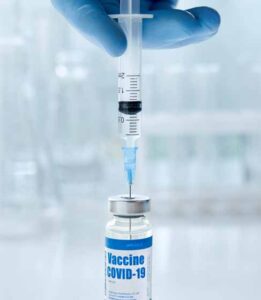 At a recent ACR virtual town hall, panelists presented a wealth of data on immune responses to, and side effects of, COVID-19 vaccination in patients with rheumatic disease and their implications for patient care and management. Panelists also discussed the importance of leveraging monoclonal antibody treatments, especially in light of virus variants.
At a recent ACR virtual town hall, panelists presented a wealth of data on immune responses to, and side effects of, COVID-19 vaccination in patients with rheumatic disease and their implications for patient care and management. Panelists also discussed the importance of leveraging monoclonal antibody treatments, especially in light of virus variants.
Efficacy in Immunosuppressed Patients
The first presenter, Alfred Kim, MD, PhD, an assistant professor in the Division of Rheumatology, Washington University School of Medicine, St. Louis, has been working with colleagues at his institution and at the University of California, San Francisco, to study the effects of different types of immunosuppressive medications on immune responses in patients with rheumatic disease who receive COVID-19 vaccination.1

Dr. Kim
Summarizing what is currently known, Dr. Kim noted that the majority of patients with rheumatic disease taking immunosuppressive drugs do become seropositive, meaning they produce detectable levels of antibodies in response to vaccination against SARS-CoV-2. Composite seropositivity rates for immunosuppressed patients with rheumatic illness in various studies range from 75–94%, although it is important to note that lower rates have been found for certain subsets of patients taking specific medications. This contrasts with 95–100% positivity in immunocompetent participants in these studies and in general clinical vaccine trials.1-9
Patients with rheumatic disease taking immunosuppressive medications demonstrate a modest decrease in the number of antibodies produced, with an estimated 1.4-fold to three-fold reduction relative to immunocompetent individuals included in comparator groups.1-9
“Does this mean [these patients] are less protected?” Dr. Kim asked. “This is an answer I can’t provide, and I don’t think we are going to have an answer any time soon.” We don’t know yet what antibody level—or that of other potential immune markers—imparts protection.
Dr. Kim noted that, for most of the study patients, levels of antibodies to help prevent viral infection assessed by general tests seemed to correlate well with levels of neutralizing antibodies shown on in vitro assays. This indicates “the vaccination of immunosuppressed patients with rheumatic disease is effective for the most part,” he said.
The research community has also identified specific types of immunosuppression that seem to have the largest effects on antibody production. For these patients, seropositivity rates are lower compared with pooled rates of patients on different types of immunosuppression. Not surprisingly, given the role of B cells in mounting an antibody response, B cell depleting therapies, such as rituximab, may reduce antibody titers the most; reported seropositivity rates range from 26% to 68%, with antibody titers ranging from sevenfold to 625-fold lower than immunocompetent people.1,2,4,8,10-12 Notably, Dr. Kim explained, patients can successfully generate at least some antibodies—even if not quite at the levels of immunocompetent individuals—if they receive vaccination at least six months after their last dose of rituximab.



